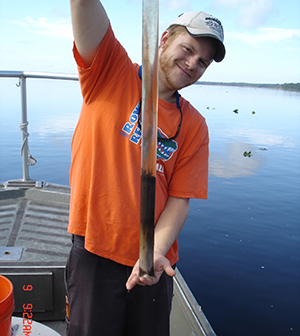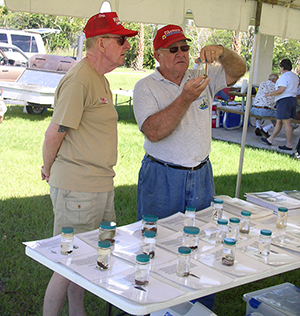What is Florida LakeWatch?
Florida LAKEWATCH is a citizen volunteer lake monitoring program that facilitates "hands-on" citizen participation in the management of Florida lakes, estuaries, rivers and springs through monthly monitoring activities.
Coordinated through the University of Florida's Institute of Food and Agricultural Sciences/FFGS Fisheries and Aquatic Sciences, the program has been in existence since 1986. In 1991, the Florida Legislature recognized the importance of the program and established Florida LAKEWATCH in the state statutes (Florida Statute 1004.49.). LAKEWATCH is now one of the largest lake monitoring programs in the nation with over 1800 trained citizens currently monitoring 525 lakes, 175 estuary stations, 125 river stations, 20 coastal dune lakes, and 10 spring runs in 57 counties.
LAKEWATCH has been extremely successful for 30 years, thus the Editor of Florida Scientist asked LAKEWATCH to write an article describing how LAKEWATCH started, how it has maintained its success and what difficulties were overcome to make it such an important example of citizen science in action. The Editor was putting together a whole volume of the journal on citizen science and wanted to use LAKEWATCH as a successful example and potential template for others wishing to use citizen scientists. The article accurately describes the birth and evolution of the program and was recently printed (Hoyer et al. 2014). The following lists the citation and abstract of the article with the whole article attached below:
Hoyer, M. V., D. L. Bigham, R. W. Bachmann, and D. E. Canfield, Jr. 2014. Florida LAKEWATCH: Citizen Scientists Monitoring Aquatic Systems and How Data Are Used. Florida Scientist. 77: 184197.


Abstract
Florida LAKEWATCH is a successful example of a long-term volunteer water quality monitoring program that started in 1986. Working with thousands of volunteers, these dedicated citizen scientists have collected reliable long-term water quality data for over 1100 lakes, 175 coastal sites, 120 rivers, and 5 springs. These data encompass water resources in 57 Florida counties. This manuscript describes the start and evolution of LAKEWATCH, including discussions of the following two major (of the many) hurdles to the continued success of the program: 1) demonstrating to professional groups that trained volunteers are capable of collecting credible (research and regulatory quality) data, and 2) maintaining consistent long-term funding. Funding is especially critical because trained and committed core staff is needed to work along with volunteers. Quality staff members are also important to provide direction, ensuring consistent data are collected and enough sites are monitored to answer statewide questions such as how geology impacts water chemistry in Florida. Examples are also provided on how LAKEWATCH data have been used to address lake management issues (i.e., ‘‘fixing’’ the problem) in the State of Florida. We hope the Florida LAKEWATCH experience assists other groups who have a vast army of citizen scientists waiting to get involved and then to best develop a successful monitoring program.
How Does Florida LAKEWATCH WORK?
- Florida LAKEWATCH works directly with citizen volunteers who live on (or use) lakes, estuaries, rivers, springs and are willing to participate in a long-term monitoring effort.
- To become part of the LAKEWATCH team, volunteers are required to have access to a boat, almost any kind, and complete a training session, on their lake, which takes about two hours. The training session includes learning techniques for collecting water samples, filtering lake water to obtain algae samples, and taking Secchi disk readings (or water clarity readings).
- Once the volunteer is certified by one of our LAKEWATCH staff or approved trainers and sampling sites are established, volunteer samples the system (s) once a month for a minimum of two years. The sampling kit is supplied by the LAKEWATCH program and refurbished as needed.
- Volunteers are then asked to freeze their water samples and deliver them to the nearest collection center. The samples are stored in a freezer at the collection center until one of the LAKEWATCH staff arrives to pick them up. The samples are then taken to the University of Florida's Fisheries and Aquatic Sciences water chemistry laboratory for analysis. For more information about LAKEWATCH sampling download a copy of "A Day In The Life Of A Water Sample" (LAKEWATCH Newsletter Volume X) from the Newsletter page.
- The information compiled from these samplings is used to create a long-term database that can serve as documentation of current water chemistry conditions - to be compared with future water chemistry conditions. These data are available for downloading by county (data). LAKEWATCH data also provide much-needed information for lake management decisions. LAKEWATCH data are included in the Florida Atlas of Lakes web site (especially for volunteers).
- About 20 LAKEWATCH regional meetings happen in a given year located across the state of Florida. LAKEWATCH staff meet with the volunteers (and other interested people) to provide an interpretation of the collected data, general information on lake management and lake ecology and finally field any questions volunteers may have on the management of their system.
- In return for their participation in LAKEWATCH, volunteers receive:
- a quarterly educational newsletter,
- supplies and use of sampling equipment,
- individualized training in monitoring procedures,
- annual report on their lake, including an annual data packet for their lake,
- access to lake experts
- invitations to regularly scheduled LAKEWATCH meetings.
For more information contact:
Florida LAKEWATCH,
Fisheries and Aquatic Sciences,
UF/IFAS School of Forest Resources and Conservation
7922 NW 71st Street
Gainesville, FL 32653-3071
Toll-free Message Line: 1-800-LAKEWATCH (525-3928)
Phone: 352/292-4817 Fax: 352/392-4902
Email: fl-lakewatch@ufl.edu

